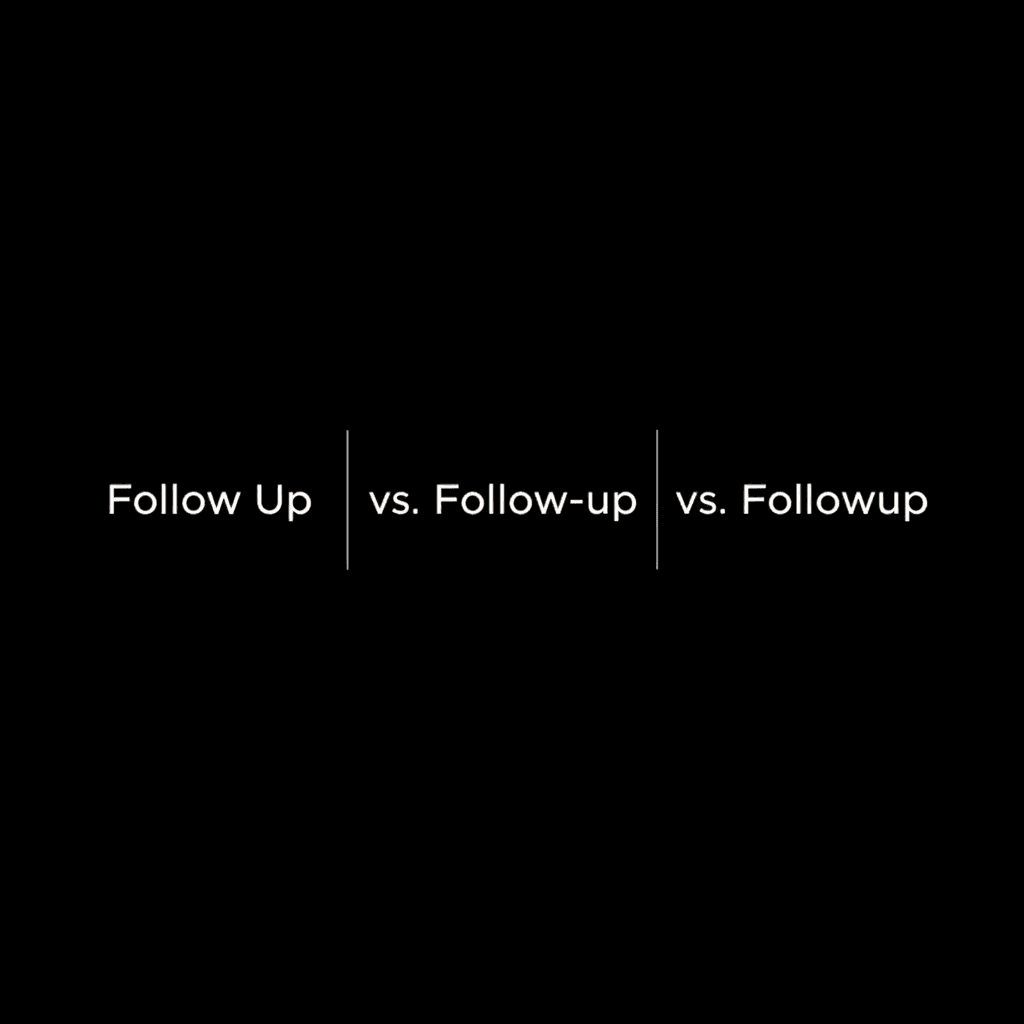Follow Up vs. Follow-up vs. Followup: What’s the Difference?
 These three versions — follow up, follow-up, and followup — are often mixed up, but each serves a different grammatical purpose. The meaning is the same (“to check back” or “continue a process”), but the part of speech changes how you write it.
These three versions — follow up, follow-up, and followup — are often mixed up, but each serves a different grammatical purpose. The meaning is the same (“to check back” or “continue a process”), but the part of speech changes how you write it.
Let’s make it clear once and for all.
1. Follow up (verb)
Meaning
“Follow up” (two words) is a verb.
It means to check on, continue, or take action after something has happened.
Examples (10 total)
- I’ll follow up with you tomorrow.
- Can you follow up on that email?
- She plans to follow up after the meeting.
- Please follow up with the client about the payment.
- The doctor will follow up next week.
- I forgot to follow up on the project deadline.
- Let’s follow up on this discussion later.
- The manager didn’t follow up with the vendor.
- He promised to follow up once he gets an update.
- They’ll follow up the survey results with a report.
🧠 Tip:
If it’s something you do, it’s two words — follow up.
2. Follow-up (noun or adjective)
Meaning
“Follow-up” (with a hyphen) is used as a noun or adjective.
It refers to a thing (noun) or action (adjective) that comes after an initial event.
Examples (10 total)
- Let’s schedule a follow-up meeting. (adjective)
- She sent a follow-up email. (adjective)
- The doctor scheduled a follow-up appointment. (noun)
- Did you receive my follow-up message? (noun)
- We had a follow-up discussion about the report. (noun)
- A follow-up call was made after the interview. (adjective)
- The team will have a follow-up review next week. (adjective)
- The follow-up on that complaint took too long. (noun)
- I sent a quick follow-up note this morning. (noun)
- The follow-up meeting went smoothly. (noun)
🧠 Tip:
If you can put a or the in front of it (“a follow-up”), it’s hyphenated.
3. Followup (noun, informal)
Meaning
“Followup” (one word, no hyphen) is a modern informal variant of follow-up.
It’s often seen in emails, tech tools, or quick messages, but it’s less formal than follow-up and not preferred in academic or professional writing.
Examples (5 total)
- Just sending a quick followup on our chat.
- Please review the followup I sent yesterday.
- The followup process is automated in our CRM.
- Let’s talk about the followup later.
- Thanks for the followup — I appreciate it.
🧠 Tip:
Use follow-up (with a hyphen) for professional writing.
Use followup only in casual or digital contexts (like chat tools).
Quick Comparison Table
| Form | Part of Speech | Meaning | Example | Formality |
|---|---|---|---|---|
| Follow up | Verb | To act or check again | I’ll follow up tomorrow. | ✅ Formal |
| Follow-up | Noun / Adjective | A thing or action that follows | Send a follow-up email. | ✅ Formal |
| Followup | Noun (informal) | Modern, casual version of “follow-up” | Thanks for the followup. | ⚠️ Informal |
How to Remember the Difference
👉 Follow up → an action you take (I’ll follow up with her.)
👉 Follow-up → a thing (meeting, call, email) that happens later (Let’s schedule a follow-up call.)
👉 Followup → a casual modern shorthand (Quick followup on this?)
💡 Memory Trick:
“If it’s something you do, it’s two.
If it’s something you name, add a hyphen.”
Common Mistakes
❌ I will send a followup tomorrow.
✅ I will follow up tomorrow.
❌ Please do a follow up report.
✅ Please do a follow-up report.
❌ I sent you the follow up.
✅ I sent you the follow-up.
Why AI Tools Often Get It Wrong
Because followup looks like a convenient shortcut, many AI systems (and even humans) use it inconsistently.
That’s why Humanizey helps rewrite AI-generated content with proper grammar and consistent style — catching subtle distinctions like this automatically.
FAQs
1. Is “followup” a real word?
Technically yes, but it’s informal and not recommended in professional contexts.
2. Should I use “follow-up” in emails?
Yes — it’s the preferred form when referring to a “follow-up email” or “follow-up call.”
3. Can “follow up” be one word?
Only when used as a noun or adjective with a hyphen (follow-up). As a verb, it’s always two words.
4. What’s the plural of “follow-up”?
It’s follow-ups (e.g., We scheduled two follow-ups this week.)
Practice: Choose the Correct Form
(Answers are listed at the end.)
- I’ll ___ with you next Monday.
- She sent a quick ___ email this morning.
- The doctor scheduled a ___ appointment.
- Thanks for the quick ___.
- We need to ___ after the meeting.
- He’s responsible for all customer ___.
- Please ___ on this issue by Friday.
- Did you get my last ___?
- We’ll have a short ___ call tomorrow.
- The manager didn’t ___ on that task.
Answers
- follow up
- follow-up
- follow-up
- followup / follow-up
- follow up
- follow-ups
- follow up
- follow-up
- follow-up
- follow up
